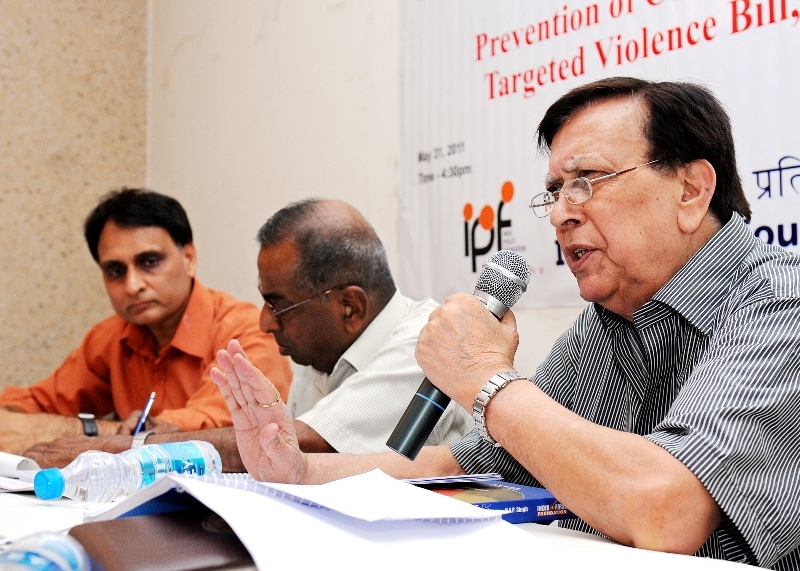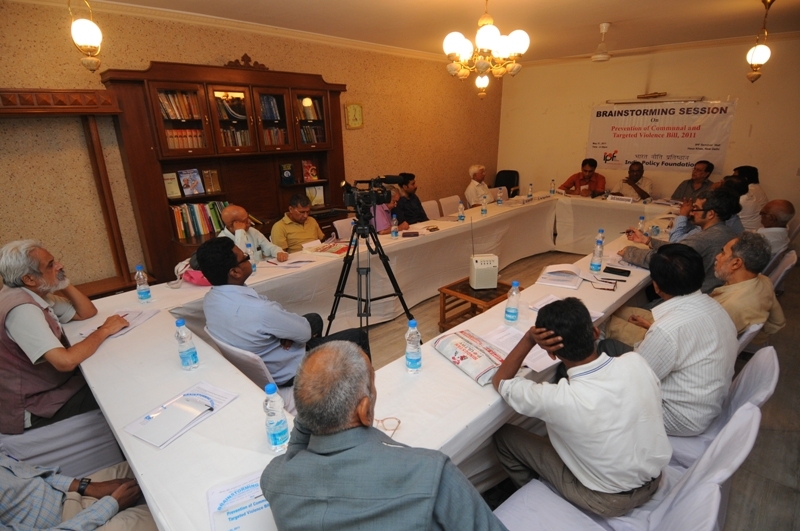Prevention of Communal and Targeted Violence Bill
Total Views |

May 31, 2011, IPF Seminar Hall
The Prevention of Communal and Targeted Violence Bill 2011 is not only constitutionally flawed, but also politically motivated and has dangerous implications for the country’s unity and must be rejected outright, a number of intellectuals said at the seminar on the Bill.
Prof Rakesh Sinha, introduced the subject and said that a reading of the proposed Bill makes it clear that if it is allowed to become law, the ramifications for the nation will indeed be very dangerous. Not only will it endanger Indian citizens’ freedom, but will also render the very concept of free speech and expression obsolete and open the doors to fascism and totalitarianism. The very idea of alternative thought and action would be shackled for good. If this draconian Bill were to become a law and applied with retrospective effect, even persons of eminence like the late BT Ranadive and Acharya Kripalani would face criminal action for having spoken the plain truth about aggressive minoritism in this country.
R Venkatanarayanan, who explained the clauses of the proposed Bill, said a strange feature of the Bill was that it carried no preamble, objective or purpose. This only strengthens the suspicion that it has been brought in with malicious intent. All concerned citizens need to ask whether it is only Christians and Muslims who are aggrieved? Narayanan said that it was appalling that even after 60 years of independence, a Bill like this was being sought to be drafted by a body of unelected political appointees, whose own background is shady. Narayanan also laid bare the fact that India has a history of deliberate misrepresentation of constitutional provisions regarding religious freedom by no less than the Chief Justices of the Supreme Court and warned that the proposed legislation actually intends to make Hindus permanent Dhimmis.

RNP Singh termed the proposed Bill as deep-rooted political conspiracy against the Hindu community and stated that there has been well-documented history of blaming Hindus alone for every communal disturbance in India, whereas the reality is quite different. Singh held the intellectual and academic streams of this country directly responsible for this gross distortion of facts and history. Rajesh Gogna stressed the fact that the terms ‘minority’ and ‘secularism’ have never been adequately defined in the Constitution. If these concepts are defined, this legislation cannot be passed. Rajvir Sharma compared this Bill to the draconian MISA of the notorious Emergency era, while veteran journalist Rambahadur Rai said that the ruling Congress, faced with erosion of its political base, is now trying to divert the people’s attention from growing national crises. Satish Pednekar of Jansatta termed it as the ruling dispensation’s desperate ploy to woo its lost minority vote-bank.
The seminar resolved that the Bill is an attempt to damn the basic structure of the Indian Constitution. Moreover, it is an attack on the federal character and a ploy to divert people’s attention from the real issues the nation is facing.
The following have been identified as the dangerous features of the Bill:-
1. The Bill dilutes and destroys the concept and sanctity of Indian citizenship by dividing Indian citizens into two categories, one of the religious and linguistic minorities, and the other consisting of the rest
2. It recommends a separate, parallel CrPC for the minorities
3. It destroys the federal character and usurps the jurisdiction of the State.
4. It is a tool to amend the Constitution in a shrewd and simple manner
5. It creates parallel authorities at the Centre and the States
6. It makes the bureaucracy and police slaves of minority leadership
7. A new minority veto is proposed in the Bill
8. The onus of communal riots will rest on the Hindus
9. ‘Minorities’ are presented as permanent ‘victims’ of the Hindu majority, police forces, bureaucracy, judiciary
10. Authorities created at the Centre are empowered to use Article 355 as they like
11. It assumes ‘tyranny’ of the Hindu ‘majoritarianism’
A cross-section of journalists, former bureaucrats and legal luminaries spoke on the malicious intent and contents of the UPA’s proposed move.
The Panel Members of the programme were: Sh. R. Venkatanarayanan, Former Secretary Government of India, Sh. RNP Singh, Managing Editor, Eternal India, Prof. Rajvir Sharma, University of Delhi, Sh. Rajesh Gogna, Civil Rights Activiist and Lawyer, Sh. Rambahadur Rai, Senior Journalist, Sh. Manmohan Sharma, Senior Journalist, Sh. Priyadarshi Dutta, Journalist, Sh. G D Sharma, Sh. Jitendra Kumar Sharma, Prof. Madhukar Shyam Chaturvedi, Jaipur University, Sh. R N P Singh, Managing Editor, Eternal India, Prof. Rajvir Sharma, University of Delhi, Prof. Rajkumar Bhatia, Senior Journalist, Prof. A.P. Singh, National Law University, Sh., Satish Pednekar, Senior Jounalist, Sh. Ashutosh Bhatnagar, Journalist, Sh. Jaganniwas Iyer, Researcher , Ms. Sushma Wahengbam, Researcher